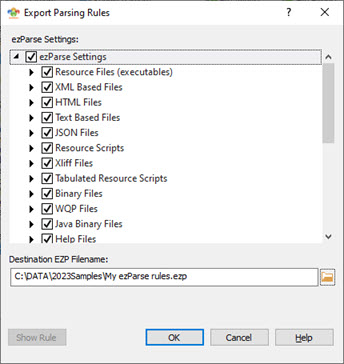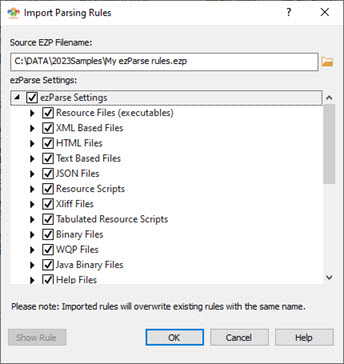|
|
Overview: ezParse Technology |
|
|
Overview: ezParse Technology |
Alchemy CATALYST provides built-in parsers for known file formats such as *.exe, *.dll, *.doc, *.htm. These are published specifications where the localizable pieces are always found in a defined location. CATALYST can read these localizable pieces and write them back out in their translated form.
There is 2nd group of file types where the localizable pieces are not immediately obvious. In this case, a localization engineer familiar with the files will use ezParse to create a parser and instruct CATALYST how to read & write files of that type. The formats where these tailored parsing rules can be created are:
Microsoft Excel (sheets and columns and are treated like Database tables and fields)
ezParse technology comes as standard with Alchemy CATALYST and is designed to help you develop file parsers without writing a single line of code! You create the rule from a sample of the format and see the effect of that rule as you create it. This ability to preview your results makes the process easier and reduces the time to develop ezParse™ rules specific to your files and projects.
Alchemy ezParse™ technology can process a wide variety of encoding systems.
|
File Encoding Type |
Description |
|
UTF-8 |
Variable length encoding system. |
|
UTF-16 |
Fixed width, double-byte encoding system. Support for Big Endian and Little Endian |
|
Code Page |
Windows OS code page supported files. |
Alchemy ezParse™ will always try to auto-detect the encoding of your file formats by reading the Byte Order Mark (BOM). If no BOM exists in your file, Alchemy CATALYST will use the source and target language settings to process your file. In most cases this will be the codepage of the currently installed Windows Operating System. (i.e. ANSI for US English systems and Shift-JIS for Japanese systems.)
Alchemy ezParse™ will always maintain the encoding system of your files when they are extracted from Alchemy CATALYST. So for example, if you insert a UTF-8 encoded file, upon extraction it will also be encoded using UTF-8.
You can save ezParse rules for use on different machines or for sharing with other members of your team.
Use the File Types & Parsing Rules on the HOME ribbon to export rules.
File Export...
OR
If you have created a useful parser that we should host for the CATALYST community - choose Submit Parser. This creates an email for our support team which you can review before submitting.

Using the mouse click on the name or group of ezParse rules that you wish to export.
Use the Browse button to locate a working folder and then specify a file name for your exported and saves rules.
Press OK to export your rules and return to ezParse.
You can import saved ezParse rules from disk or by viewing those rules that are available online.
Use the File Types & Parsing Rules on the HOME ribbon to export rules.
Note: when viewing online repository, only rules you don't already have will appear in the list.

Use the Browse button to locate a file containing your ezParse rules. These files have an extension of EZP.
Using the mouse click on the rules or group of rules that you wish to import into Alchemy CATALYST.
Press OK to import your rules and return to ezParse.
|
|
Imported rules will always overwrite existing rules of the same name. To make a backup copy of your ezParses rules use Export. |
Read the following topics for information on how to create/edit ezParse rules
Create a Simple ezParse Rule for parsing text files.
Create an Advanced ezParse Rule with Regular Expression for parsing ID based text files
Defining XML Rules: a simple rule for parsing XML files
Defining Conditional XML Rules: a rule for parsing Conditional XML files
View/Download Online ezParse Rules